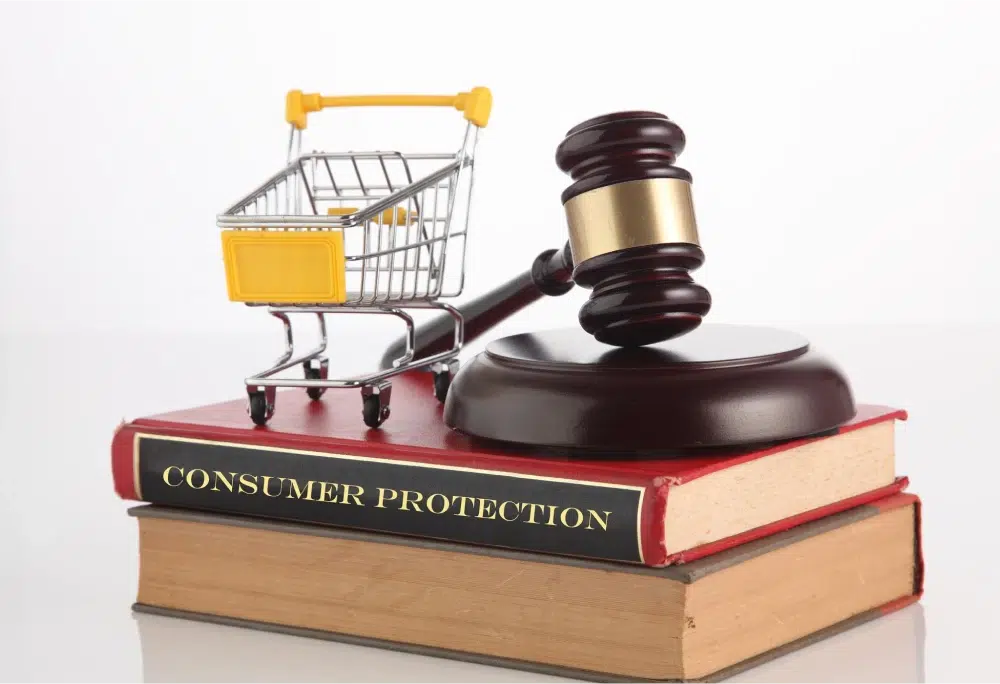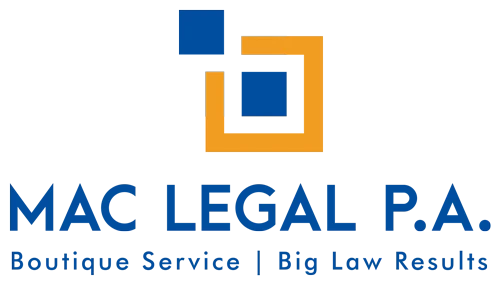Navigating consumer rights can feel like trying to find your way through a thick fog, with the potential of bumping into surprises lurking around the corner. Thankfully, consumer protection laws are this beacon of light that are able to break up that fog while offering a safeguard against the risk of harm, both physically and financially. These laws make sure that the balance of power in the marketplace leans a bit more towards the individual, protecting against deceptive practices like false advertising, product liability issues, and more.
Knowing how these laws function and can be applied in one’s favor is not just empowering—it’s essential in today’s fast-paced commercial world.
As we dive into our discussion, we’ll explore the nuts and bolts of consumer rights protection laws, including the vital roles played by agencies such as the Federal Trade Commission, Consumer Financial Protection Bureau, and Consumer Product Safety Commission. From learning federal and state-level protections to recognizing the practical applications of these laws in daily life, this article will arm you with knowledge needed to turn the tables in your favor.
Understanding Consumer Rights Protection Laws

Definition and Importance
Consumer protection laws are designed to shield consumers from fraudulent business practices, defective products, and dangerous goods and services. These laws are important in maintaining a reliable market economy by ensuring that sellers remain honest, preventing unpleasant surprises. In the United States, consumer protection laws cover a variety of federal and state statutes, each targeting specific sectors of the economy. The Federal Trade Commission (FTC) plays a role at the federal level, regulating aspects such as warranties and service contracts, while state agencies enforce additional local consumer protections.
These laws also extend into financial sectors, safeguarding against predatory lending, housing discrimination, and other unethical financial practices. Notably, the Fair Housing Act and the Fair Debt Collection Practices Act are key statutes that prevent discrimination in housing and regulate the conduct of debt collectors, respectively.
Historical Background
The concept of consumer protection is not new and has been a part of legal systems for centuries. Historical records from Roman law reveal provisions to protect buyers, such as the right to claim defective goods. Over time, the relationship between vendors and buyers evolved, particularly evident in the municipal laws from the Kingdom of Bohemia in the 16th century, which regulated market transactions and trading practices.
Significant advancements in consumer rights protection were seen in the 20th century. For instance, the United States witnessed a major shift in the 1960s when President Kennedy introduced the Consumer Bill of Rights to Congress, laying the foundation for modern consumer protection laws. This led to the creation of comprehensive statutes like the Fair Credit Reporting Act (FCRA) and the Truth in Lending Act (TILA), which provide protections against unfair credit practices and ensure transparency in financial transactions.
Consumer protection laws have evolved a lot over the years, driven by a need to balance the scales in consumer-business transactions and safeguard consumers from bad practices. These laws not only protect individual rights but also enhance the overall integrity of the market, making them an essential element of a functional and fair economy.
Federal and State Level Protections
In the United States, consumer protection is enforced at both federal and state levels, ensuring a comprehensive framework that guards against unfair and deceptive business practices. This dual-layered approach not only broadens the scope of protection but also tailors enforcement to the specific needs of different regions.

Federal Trade Commission (FTC)
At the federal level, the FTC stands as a cornerstone of consumer protection. Established under the Federal Trade Commission Act, the FTC’s Bureau of Consumer Protection addresses activities that affect consumers’ daily lives. It combats fraudulent business practices by collecting complaints, conducting investigations, and pursuing legal actions against violators.
Notably, the FTC has adapted to the digital age, developing new regulations to tackle online deceptive practices such as the manipulation of product reviews and endorsements. This includes actions against fake reviews, the suppression of negative feedback, and undisclosed paid endorsements.
The agency also plays a crucial role in educating consumers and businesses about their rights and responsibilities, ensuring a fair marketplace. The FTC’s annual reports provide valuable insights into the nature and volume of complaints received, highlighting prevalent scams and areas of concern such as the surge in robocalls facilitated by modern technology.

State Agencies and Statutes
States have their own consumer protection laws that sometimes offer more protection than federal laws. States like California, New York, and Illinois have strong consumer protection. For example, California’s Consumers Legal Remedies Act and the California Consumer Privacy Act set high standards for consumer rights and data privacy.
Each state has a consumer protection office that handles complaints, investigates scams, and enforces state laws. These offices help address local issues and provide residents with a resource for assistance. Some states have flexible laws that quickly adapt to new consumer threats. For example, Illinois has a law that protects the privacy of biometric data. This combination of federal and state efforts guarantees that consumers have rights and protections no matter where they live.
Key Consumer Protection Laws

Fair Debt Collection Practices Act (FDCPA)
The Fair Debt Collection Practices Act (FDCPA), established in 1977, seeks to eliminate abusive, deceptive, and unfair debt collection practices. It covers various aspects of debt collection, ensuring that debt collectors who avoid abusive practices are not at a competitive disadvantage. Specifically, the FDCPA provides guidelines on the appropriate conduct for debt collectors, including the times and methods of communication with debtors, prohibitions on misleading representations, and the use of harassment or abuse in debt collection.
Fair Credit Reporting Act (FCRA)
The Fair Credit Reporting Act, enacted in 1970, plays a crucial role in consumer financial protection by regulating the collection, dissemination, and use of consumer credit information. Governed by the Federal Trade Commission and the Consumer Financial Protection Bureau, the FCRA guarantees accuracy, fairness, and privacy of consumer information held by credit reporting agencies. Key provisions include consumers’ rights to access their credit reports, dispute inaccurate information, and obtain damages for violations.
The act restricts who can access consumer credit information and under what circumstances, emphasizing consumer rights to privacy and fairness.
Gramm-Leach-Bliley Act (GLBA)
Also known as the Financial Services Modernization Act of 1999, the Gramm-Leach-Bliley Act addresses consumer financial privacy. The GLBA mandates that financial institutions must inform customers of their information-sharing practices and afford them the right to opt-out if they do not wish their information to be shared with certain nonaffiliated third parties. This act reinforces the protection of nonpublic personal information, with strict requirements on how financial institutions can share and disclose consumer data. The FTC is tasked with enforcing the act’s provisions, making sure financial institutions comply with the set privacy protections.
These laws collectively form a framework for protecting consumers from financial harm, ensuring that their rights are not infringed upon by businesses or financial institutions. By understanding these protections, consumers can better navigate their financial interactions and seek recourse in instances where their rights are compromised.
Practical Applications of Consumer Rights

Dealing with Faulty Products
When consumers encounter defective products (malfunctioning appliances, a vehicle that doesn’t meet safety standards, etc.) they have multiple ways to seek redress. Under consumer protection laws, individuals are entitled to products that perform as advertised and are free from defects. If a product fails to meet these standards, consumers can explore their warranty rights, which are often categorized into express warranties and implied warranties.
Express warranties are specific promises made by sellers or manufacturers regarding the quality or functionality of their products. Implied warranties, on the other hand, automatically apply to most purchases and assure that the item is fit for its intended use. If a product is found to be defective within a reasonable time frame, consumers can demand repairs, replacements, or refunds. In cases where the defect emerges after the warranty period, or if the seller is unresponsive, consumers might need to escalate the matter through legal channels, potentially leading to a lawsuit.

Filing Complaints and Lawsuits
For issues that cannot be resolved directly with the seller or manufacturer, consumers can file formal complaints with various agencies. The process typically involves submitting an account of the issue to organizations such as the Consumer Financial Protection Bureau (CFPB) or the Federal Trade Commission (FTC). These agencies collect complaints and, depending on the nature of the issue, may direct them to other relevant authorities or take direct action.
Consumers can submit complaints about a wide range of financial products and services, including credit cards, mortgages, and loans, among others. The complaint process is streamlined to make sure that it is accessible, with options to file online or via phone in multiple languages. Once a complaint is filed, it is reviewed and forwarded to the company involved, which is generally required to respond within 15 days.
How to Leverage Consumer Rights Laws

Steps to Take if You are Wronged
If you suspect a scam or have been wronged by a business, immediate action is important. Start by reporting the incident to your local police or sheriff’s office. Additionally, you should contact your state attorney general. The National Association of Attorneys General website provides contact information for each state. For older individuals or those with disabilities who are victims of financial exploitation, reaching out to local adult protective services is advisable. These can be located using the online Eldercare Locator or by calling (800) 677-1116.
Any fraudulent activities or scams should be reported to the Federal Trade Commission (FTC). Since scams vary, you might also need to contact other local, state, or federal agencies depending on the specifics of your situation.
Seeking Legal Help
When facing issues such as harassment from debt collectors, false advertising, or injuries from unsafe products, consulting with a consumer protection attorney should be on the table. You’ll want to start by explaining your issue to make sure it falls within the attorney’s area of experience.
Consumer law covers a wide range of issues, and finding an attorney with the right specialization is key. Use available resources like your state’s bar association website to verify the attorney’s credentials and standing.
By understanding these legal avenues, consumers can effectively leverage consumer rights laws to protect themselves and seek justice. This not only serves individual interests but also upholds the integrity of market transactions and consumer trust.
Tips On How to Avoid Common Scams

- Stay Informed
Keep abreast of the latest cybersecurity threats and scams. Agencies like the Cybersecurity and Infrastructure Security Agency (CISA) provide updates and alerts that can help you stay one step ahead of scammers.
-
- Guard Your Information
Do not share personal information such as Social Security numbers, account details, or passwords, especially over unsecured platforms. Be cautious of emails or calls requesting confidential information.
-
- Verify Sources
Always verify the legitimacy of requests for information or money. Contact the organization directly using verified contact details rather than those provided in a suspicious email or message.
-
- Use Strong Passwords and Update Regularly
Implement robust passwords and change them periodically. Utilize multi-factor authentication wherever possible to enhance security.
-
- Monitor Your Accounts
Regularly check your financial statements and accounts for unauthorized transactions. Set up alerts with your bank to notify you of any suspicious activity.
-
- Educate Yourself and Others
Understanding what red flags look like and how scams typically operate can be your best defense. Share this knowledge with friends and family to protect your wider community.
-
- Report Suspicious Activities
If you encounter or fall victim to a scam, report it immediately to relevant authorities such as the Federal Trade Commission (FTC) or your local consumer protection agency. This not only helps you potentially recover lost funds but also aids in preventing further scams.
By recognizing the red flags of fraud and taking proactive steps to protect yourself, you can significantly reduce the risk of becoming a scam victim.

Consumer Rights Protection Laws Really Can Help
Throughout this article, we’ve broken down the complexities of consumer protection laws, outlining how these regulations serve as a critical shield against the bad practices that can permeate the marketplace. By highlighting roles of key agencies and legislation, the discussion underscores the resources and avenues available for consumers to safeguard their rights.

Consumer Rights Questions (FAQ)
What advantages do consumer protection laws offer?
Consumer protection laws are specifically crafted to safeguard consumers against dishonest business tactics, faulty products, and dangerous goods and services. They set legal limits and guidelines, fostering a fairer relationship between consumers and sellers by deterring deceptive and unethical practices.
Why is consumer protection crucial?
Consumer protection is essential as it ensures that markets function fairly for both businesses and consumers. It provides consumers with reliable, impartial information about the products and services they buy, enabling them to make informed decisions that align with their best interests and protecting them from exploitation.
Why should consumers be informed about their rights?
Being aware of their rights is vital for consumers, especially to protect vulnerable groups like the elderly, children, and those with disabilities who are more susceptible to exploitation by unethical businesses. Consumer rights offer a layer of defense against such exploitation.
How do consumer protection laws guard against unfair business practices?
The Bureau of Consumer Protection at the Federal Trade Commission (FTC) combats unfair, deceptive, and fraudulent business practices. It does this by gathering consumer complaints, conducting investigations, prosecuting lawbreakers, and educating both consumers and businesses about their rights and responsibilities.
With a strong reputation in Hollywood, FL, MAC Legal P.A. provides legal services in various areas of practice. We are passionate about advocacy and offer free consultations. Call us at (754) 253-3452 or email info@maclegalpa.com. Our office is located at 4601 Sheridan Street Suite 205, Hollywood, FL 33021.









